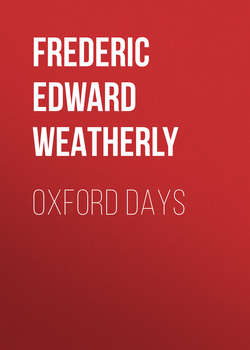Читать книгу Oxford Days - Frederic Edward Weatherly - Страница 4
CHAPTER III
THE FRESHMAN’S TERM
ОглавлениеStrolling towards the Lodge on Monday morning—because everybody seemed to be strolling in that direction—Frank had his attention called to various notices posted in the gates. One was to the effect that “the Master would see the gentlemen that morning between 10 a.m. and noon, the freshmen on Tuesday, between the same hours.” Another that “the Dean would be glad to see the freshmen at ten, the other gentlemen after.” There was also a list of places in Hall; announcements of the meetings of the College Debating Society, Boat Club, Cricket Club; Greek Testament Lecture, sine ulla solemnitate (i.e. without cap and gown), at Mr. Wood’s house every Sunday evening at nine. He was one of the married Fellows—a hard-working, energetic man.
Without quite knowing what “seeing the freshmen” meant, Frank got his gown, and as it was five minutes to ten, made his way to the Dean’s rooms. In the passage outside he found about twenty freshmen cooling their heels, and engaged, some more and some less, in questions or chaff with George, the Dean’s scout. George usually had the best of it. In fact, the freshman who dared to argue with him on matters of custom or local politics, and especially local politics, found himself considerably “shut up.”
A door opened, and a sort of snort from within indicated to George that the Dean was ready to see the freshmen. One by one they filed in, and were greeted by the Dean with a smile that was naturally faint but tried to be sweet, and a grasp of the hand that was meant to be cordial but was unmistakably flabby. There were seats for all, but it took some minutes to get into them. The interview did not last long: just long enough, in fact, to enable the Dean to make one remark to each of the freshmen. To one, without waiting for an answer, “How is your father?” To another, “Does Mr. St. Leger intend coming forward for Slowcombe?” To another, “Have you been in Devonshire this vacation, Mr. Jones?”—Jones being, of course, a Yorkshireman who has never travelled further south than Oxford, when he matriculated in February last. To one or two a faint question as to their intentions. “Were they going to read for Honours, or for a Pass?” On the whole, Frank left the room depressed and disheartened as to his work. He had expected to be questioned as to what he had done at school: what form he was in: what books he had read; to be advised as to the turn his reading should now take; whether he should read for Honours in one examination or in more than one; or whether, in short, reading for Honours would be beyond him, and therefore waste of time. The only piece of practical information he gained was that Mr. Wood was his tutor, and to him he must apply for all particulars as to Lectures and Examinations.
